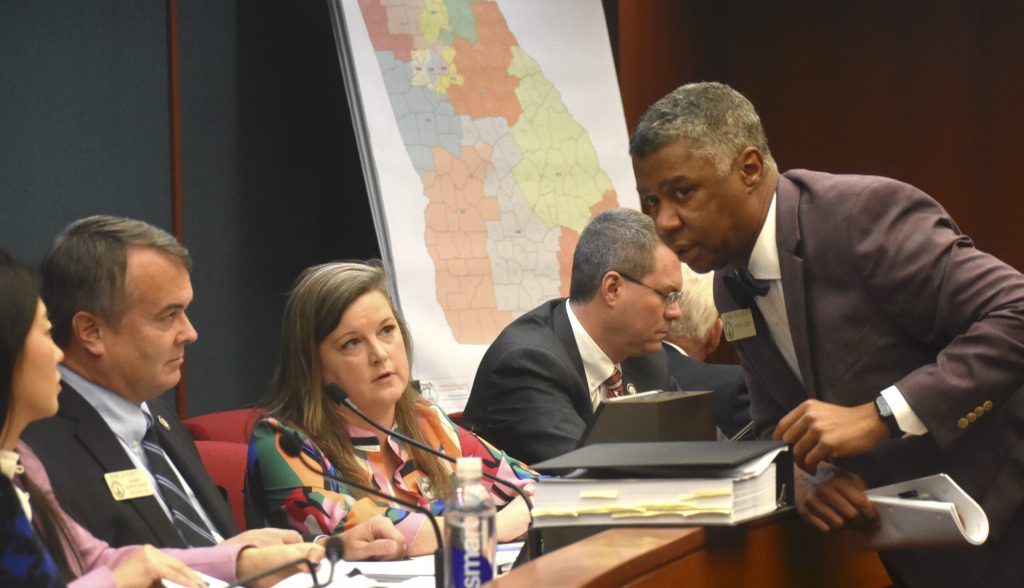Judge reviewing Georgia political maps pledges to render decision on lawfulness ‘very quickly’

House Redistricting Chairman Rob Leverett, left, speaks with House Minority Leader James Beverly before the start of a committee hearing. Ross Williams/Georgia Recorder
Georgia’s new congressional and legislative maps got their day in court Wednesday in front of federal Judge Steve Jones, who threw out the state’s 2021 attempt at drawing new electoral maps, ruling that they did not comply with the Voting Rights Act.
Lawmakers rushed through a special session early this month to redraw them, and now it’s up to Jones to determine whether they are up to snuff ahead of next year’s elections.
At the start of the hearing, Jones delivered a blow to challengers of the congressional map by saying he would focus on protecting the rights of Black voters rather than other minority groups.
The congressional map includes a new majority Black district west of Atlanta, but rearranges another majority minority district, Democratic Congresswoman Lucy McBath’s district in Atlanta’s northern suburbs, to become more white.
The district is set to go from about two-thirds minority, including Black, Asian and Latino voters, to about two-thirds white.
Democrats said that defied the spirit of Jones’ order, but he sided with Republicans on this issue, ruling that because the case had to do with harms against Black voters, he would not be accepting evidence involving other groups.
Abha Khanna, a lawyer representing the plaintiffs, said the new maps do nothing to improve Black Georgians’ ability to elect candidates of their choice, comparing the Peach State to its western neighbor Alabama, where lawmakers unsuccessfully tried to rebuff a court order to create a new majority Black congressional district, spurring a judge to call in an outside expert to draw their maps.
“Georgia clutches its pearls at the very notion it could be pulling stunts like Alabama, but make no mistake,” Khanna said.
She compared the state’s actions in drawing the maps to a classic arcade game.
“We’re going to make you chase us all over the state from district to district to achieve equal opportunity for Black voters. It’s a constant game of whack-a-mole.”
“The only whack-a-mole from the state’s perspective is the shifting themes of the plaintiffs,” retorted Bryan Tyson, a lawyer representing the state.
Tyson said plaintiffs keep changing their arguments in pursuit of a partisan goal.
“At the end of the day, the only thing that is consistent is the protection of Democratic districts,” he said.
Tyson said the Republican-led Legislature was not shy about the fact that political considerations factored into the maps. Political gerrymandering is legal, but racial gerrymandering is not. But with white Georgians more likely to support Republicans and minority Georgians tending to vote for Democrats, combing out which is which can be difficult.
Khanna suggested that because Black, Latino and Asian voters tend to vote for the same party, a coalition district like McBath’s could be considered one in which Black voters can elect a candidate of choice.
Khanna argued that the new congressional map represents a fresh violation of the Voting Rights Act, but Jones said he was not likely to rule on that question soon.
“You’re asking the court to resolve in the next 20 days a matter that took 22 months with the other map,” he said.
The debate over the state House and Senate maps came down largely to geography. Ari Savitzky, an attorney representing the plaintiffs, compared the required new majority Black districts around metro Atlanta to a shell game. He said the maps shuffle Black voters from existing majority Black districts to new ones without changing much.
Because he said the maps do not address the vote dilution in the specific districts that Jones singled out in his initial order, the new maps must be thrown out, he argued.
“It’s the voters who have been harmed, not counties, not precincts, not chunks of land,” he said.
“From the perspective of Black voters in these counties, nothing has changed.”
Near the end of the hearing, which lasted around six hours, Tyson said the maps would need to be in place by Jan. 25 so local elections offices can begin entering information into their systems, and the counties must be finished by Feb. 12.
Candidates hoping to run for the state Legislature must live in their district for a year, so time is running short for these hopefuls for campaign outreach and fundraising.
Jones pledged to continue reviewing the maps.
“I’ll give you all an answer very quickly,” he said.
SUPPORT NEWS YOU TRUST.
The post Judge reviewing Georgia political maps pledges to render decision on lawfulness ‘very quickly’ appeared first on Georgia Recorder.





